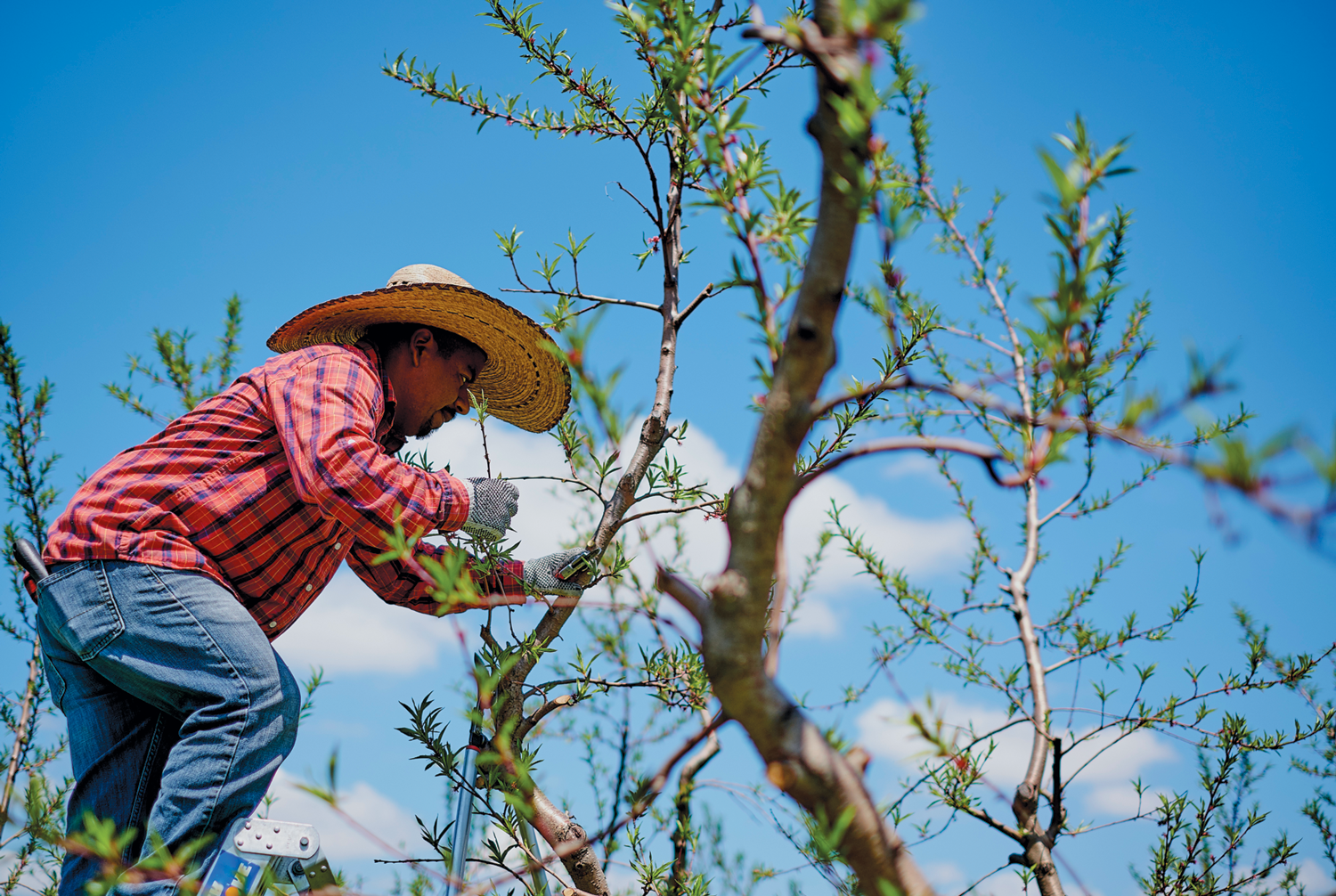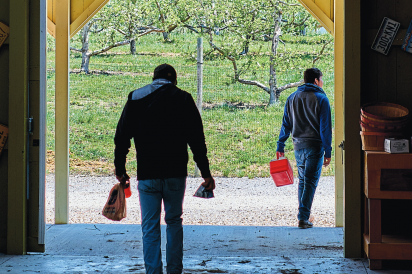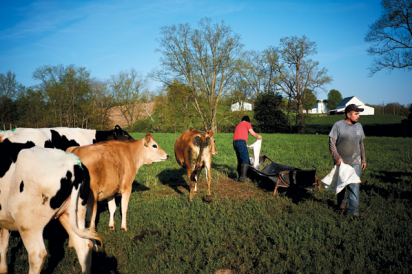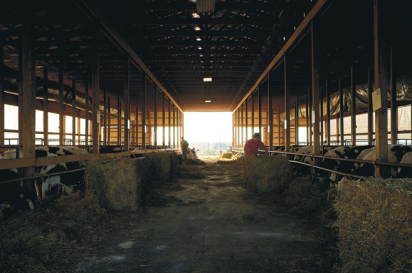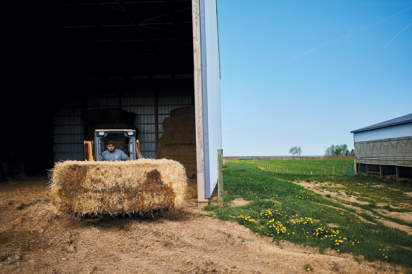The Hands That Feed Us
When Marshall Branstool, owner of Branstool Orchards in Utica, steps behind his market table filled with fresh peaches and ripe apples many are quick to notice his shirt does not have the well-known Branstool Orchards logo but instead reflects the heart of the business. The T-shirt simply reads, “Immigrants Feed America.”
In today’s political climate it may feel surprising to have a business owner make such a bold statement at what feels like a simple Saturday morning outing. To those within the food chain, however, recent focus on immigration policy is a constant reminder of how essential immigrant labor and families are to our agricultural economy.
Marshall wears his shirt to remind customers who is behind their food.
“People need to be aware and know about the work that goes on for operations of our size. We aren’t large enough to be mechanized and we aren’t small enough for just a family to manage. Our immigrant employees pick each peach and apple by hand.”
Branstool Orchards and other U-pick and agritourism farms are often the only intersection a shopper might have with the labor aspect of the food system. For one afternoon a year a family will pile into the car and drive to the countryside to pick a bushel of apples before paying the farmer for their work. Picking fruit for the afternoon feels like the perfect fall day but the U.S. fruit and vegetable industry requires a labor force of millions.
Statistics vary and are hard to collect given the nature of a migrant and seasonal workforce but according to industry associations 2.5 million farmworkers are hired annually. This includes those working to harvest fruits and vegetables as well as farmworkers tending to livestock, ranches, nurseries and fisheries. While we may imagine picturesque scenes of fresh fruit being picked from the vine, for these farmworkers work starts in the late winter to plant, prune, thin, mow grass, spray for disease and pests, build trellising, maintain fencing and infrastructure, harvest, grade, wash, pack and deliver product.
These daily tasks begin before the sun fully rises and last until it sets 14 hours later. For most farmworkers these long hours do not pay off as they would in any other industry. While Branstool Orchards ensures their employees are paid time-and-half, the agriculture industry is exempt from the overtime provisions of the Fair Labor Standards Act. Farmworkers have the lowest annual family income of any U.S. wage workers—averaging $17,000 to $19,000 a year.
Agriculture, by nature, is unreliable and lacks job security. Produce is perishable and needs to be harvested within a small time frame. Many farmworkers migrate to follow the harvest between Florida’s winter citrus, California’s spring strawberries, the Midwest’s summer sweet corn and the Carolinas’ fall sweet potato harvest. About 13,700 migrant farm workers travel to Ohio each year through H2A visa programs alone for orchard work.
Most consumers are aware of the notion that “Mexicans pick our food” and in a real sense they are correct. According to the U.S. Department of Labor’s National Agricultural Workers Survey (NAWS), immigrants account for 73% of all farmworkers and the survey showed up to 75% of those were born in Mexico. The NAWS survey reported 47% of those foreign born are undocumented immigrants, but farmworker justice surveys have shown up to 70% of the workforce goes undocumented. This is a wide range and no matter which survey results one accepts it still leaves a large portion of the workforce vulnerable.
Fruits and vegetables are not the only products that require a large immigrant population. The poultry, dairy and meatpacking industries depend on immigrant labor. More than half of all dairy workers in the U.S. are immigrants, according to a 2015 industry-sponsored study, and farms that employ immigrant labor produce 79% of the nation’s milk with over half of the immigrant labor coming from Mexico. Declining rural populations, increased herd sizes to increase farm income and family members seeking off-farm jobs for health insurance purposes has shifted family dairy farms to hired staff over the last 20 years. Dairy workers account for the highest-paying farm labor jobs.
In Licking County, Stacey Atherton of Shipley’s Dairy Farm simply says, “We do not look at our immigrant labor as cheap labor. In fact, we look at them as dependable and hardworking employees.” In this competitive labor market, employees make almost double minimum wage and have stayed employed for over a decade on the farm. Stacey has worked hard to learn Spanish to create a better work environment for everyone.
Most consumers may assume the nationality of those employed to harvest their food but most are unaware that an estimated 430,000 under-age children are working in the fields. U.S. labor laws provide no minimum age for children working alongside their parent on small farms with their parent’s permission. Children may work for hire on any farm with parental consent from age 12, and there are no legal limits on the hours children can work in agriculture outside of being enrolled in school fulltime. Industry studies have shown 25% of our food picked in the U.S. is by children as young as 6 years old.
For these children, they will go to school and then join their parents in the field through the afternoon and weekends, often working over 40 hours a week. It is a common misconception that these standards are higher for certified organic produce but the certification process does not have any labor conditions incentives. Our country’s desire for the cheapest food possible, competing with imported goods, has led to a human rights crisis in our fields.
For Columbus Rabbi Jessica Shimberg it was an article similar to this in a 2001 Gourmet magazine that opened her eyes to whose hands were picking her food and the privileged role she had held in the food system.
“My mother gave me an annual gift subscription to Gourmet, because we both enjoyed cooking and reading about great restaurants. One day, I opened the magazine to a stunning article by Barry Estabrook about the tomato industry. There was a picture of brown hands holding green tomatoes with the town of Immokalee, Florida, listed. I stopped to read the article, recalling that our family had taken a day trip to Immokalee for a boat ride and realizing that the impoverished homes we had driven by housed these migrant farmworkers. Here my family was sightseeing while human rights abuses were occurring within miles of our destination.”
The article was one of the first mainstream publications to shine a light on the work of the Coalition of Immokalee Workers (CIW). The CIW is a worker-based human rights organization organizing the farmworker community since 1993, and was reinforced with the creation of a national consumer network in 2000. In 2011, CIW launched the Fair Food Program (FFP), which focuses on a Workerdriven Social Responsibility (WSR) model based on a unique partnership among farmworkers, Florida tomato growers and participating retail buyers. Companies such as Taco Bell, Whole Foods, Trader Joe’s and more have signed on to this agreement to pay one penny more per tomato and purchase from ethically responsible growers. Other firms continue to resist joining the agreement.
As a rabbinical student, Jessica began to consider more about what it meant for her to keep kosher, not just to obey scriptural laws but also as a spiritual practice of blessing those who cultivate and harvest the food. Through this introspective learning, Jessica connected with T’ruah, an organization that brings a rabbinic voice and the power of the Jewish community to protecting and advancing human rights in North America. In October 2012, Jessica spent time in Immokalee learning from the CIW and has worked, locally and nationally, as part of T’ruah’s Tomato Rabbis (#tomatorabbis) ever since.
Rabbi Jessica’s work as the spiritual leader of The Little Minyan Kehilah has allowed her to connect and organize with other Central Ohio faith leaders and with the active Ohio State University Farmworker Alliance. The OSU chapter is a part of a national network of students and youth organizing in partnership with the CIW. Students Rachael Birri and Alex Hoey have been organizing with students on campus. Students volunteer to educate, organize, train and demonstrate the plight of the farmworker. Each year students host farmworkers from Immokalee to share their story. The CIW has been fighting for over 20 years, longer than some student organizers have been alive, but the students say they are not disillusioned and instead view the work of the CIW in holding space in a larger movement inspiring and renewing every time they take action together.
The work to create a fair food system involves protesting with your food dollars every day. Simple choices make a difference, such as buying in-season produce, especially avoiding imported and out-ofseason berries. Buy directly from producers where you can ask about farmworker conditions and seek out farmers like Stacey and Marshall who respect their employees and are grateful for their labor. Joining a CSA program and purchasing meat and dairy products from those who utilize independent meat processing facilities also helps.
As Rabbi Jessica explains, as fellow human beings, we have an obligation to “do our best to ensure the food we put in our mouths is clean, free of human exploitation; if we can know that basic human rights have not been violated—that those who tend the crops weren’t sprayed by pesticides, that they have adequate bathroom and shade access and are free from sexual assault in the fields and other work locations, why would we choose not to? In this way, the food we eat can truly nourish our bodies and our souls.”
To get involved in Central Ohio visit: Ohio For Fair Food and Farmworker Justice on Facebook. And to learn more, Rabbi Jessica recommends reading I’m Not A Tractor: How Florida Farmworkers Took On the Fast Food Giants and Won (2017) by Susan L. Marquis. The book chronicles how farmworkers have greatly improved their working conditions on farms and more.


